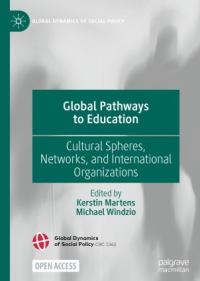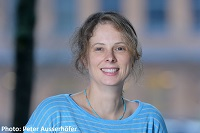
Kerstin Martens' research group B12 "Crisis Management of the Covid 19 Pandemic by International Organizations" in the CRC 1342 "Global Dynamics of Social Policy" is hiring a doctoral researcher.
Here is the comprehensive job post.

Kerstin Martens' research group B12 "Crisis Management of the Covid 19 Pandemic by International Organizations" in the CRC 1342 "Global Dynamics of Social Policy" is hiring a doctoral researcher.
Here is the comprehensive job post.

The edited volume focuses on the vertical interdependencies through carefully selected IOs, providing path-breaking and systematically aligned research on the paradigms that IOs spread across the globe
It meets a growing demand for more systematic knowledge about the development and transformation of education systems and the agency of IOs in global education governance.
The authors employ historical macro-data to identify the national and international factors which determined the introduction of and changes to education policy
This book is available open access, which means that you have free and unlimited access.
 Prof. Dr. Kerstin Martens
Prof. Dr. Kerstin MartensThe German Research Foundation (DFG) has approved a new Collaborative Research Centre (CRC) "Global Development Dynamics of Social Policy" at the University of Bremen. Over the next four years, the CRC will receive funding of around 11 million euros.
The CRC was applied for by scientists of SOCIUM (Research Centre on Inequality and Social Policy) and InIIS. The speaker will be Professor Herbert Obinger (SOCIUM). Prof. Dr. Kerstin Martens, who will also be a member of the spokesperson team, was instrumental in the application process.
Thus far, this research has focused heavily on the comparison of highly industrialized countries. In the new Collaborative Research Center, the development dynamics of social policy will be analyzed in a perspective that also encompasses the global South. The CRC’s research program will go above and beyond previous social policy research in several respects. First, the program will bring international connections and networks to the forefront of research. National social policy cannot be explained solely on the basis of domestic conditions. Trade relations, migration, war, and colonialism, as well as the worldwide spread of ideas and rules of law, are of great significance for the socio-political developments of individual countries. Second, research in the CRC will be based on a broad understanding of social policy, including, among other things, education policy. Third, the CRC will replace the nation-state internal orientation of social policy research with an interdependency-centered approach.
The research network will be composed of 16 sub-projects and divided into two project areas. Project area A “Global Development Dynamics” (Globale Entwicklungsdynamiken) will consist of six sub-projects, examining the dynamics of development in various fields of social policy worldwide and developing a "Global Welfare State Information System" (WeSIS) database to cover all fields. Prof. Kerstin Martens from InIIS and Prof. Michael Windzio are leading the sub-project "Global Development, Diffusion and Transformation of Education Systems".
Project area B "Transregional Development Dynamics" uses case-study centered qualitative analyses to investigate the causal pathways between international interdependences and socio-political development dynamics for individual groups of countries. Here, InIIS is involved in three projects:
-“Mechanisms for the Dissemination of Social Policy” headed by Frank Nullmeier (SOCIUM), Klaus Schlichte (InIIS) and Delia González de Reufels (Institute of History)
-“Open welfare states? Social Security of Labour Migration and its Impact on National Policy” headed by Prof. Susanne K. Schmidt (InIIS)
-“Transnational Welfare: Ascent, Decay and Renaissance of Social Policy in Africa” headed by Prof. Klaus Schlichte and Dr. Alex Veit (both InIIS).
In addition to the SOCIUM Research Center on Inequality and Social Policy and the Institute for International and Intercultural Studies (InIIS), other institutes of the University of Bremen will also be involved: the Institute of History, the Institute of Geography, the Institute for Labour and Economy (IAW), the Center of European Law and Politics, and the Working Group Information Management of the Department of Computer Science. Other collaborators include the Jacobs University Bremen, the University of Duisburg-Essen and the University of Cologne. The start of the Collaborative Research Center is scheduled for early 2018.
The start of the Collaborative Research Center is scheduled for early 2018.
You will find further information on the websites of SOCIUM and the University of Bremen.
 20 Jahre Institut für Interkulturelle und Internationale Beziehungen
20 Jahre Institut für Interkulturelle und Internationale BeziehungenVor 20 Jahren wurde das Institut für Interkulturelle und Internationale Studien (InIIS) an der Universität Bremen mit Unterstützung
des Senats der Freien Hansestadt Bremen gegründet.
Die damalige Idee, die beiden politikwissenschaftlichen Teildisziplinen der Internationalen Beziehungen und der Politischen
Theorie in einem Institut zusammenzuführen, hat sich als weitsichtig erwiesen. Die Forschungsthemen
und -ansätze des Instituts haben bis heute nichts von ihrer Bedeutung eingebüßt.
Gegründet von den Professoren Dr. Bernhard Peters, Dr. Dr. h.c. Dieter Senghaas und Dr. Michael Zürn hat das InIIS in den letzten
20 Jahren maßgeblich dazu beigetragen, dass die Politikwissenschaft heute zu den führenden Disziplinen an der Universität
Bremen gehört.
Das Programm können Sie hier als PDF herunterladen.